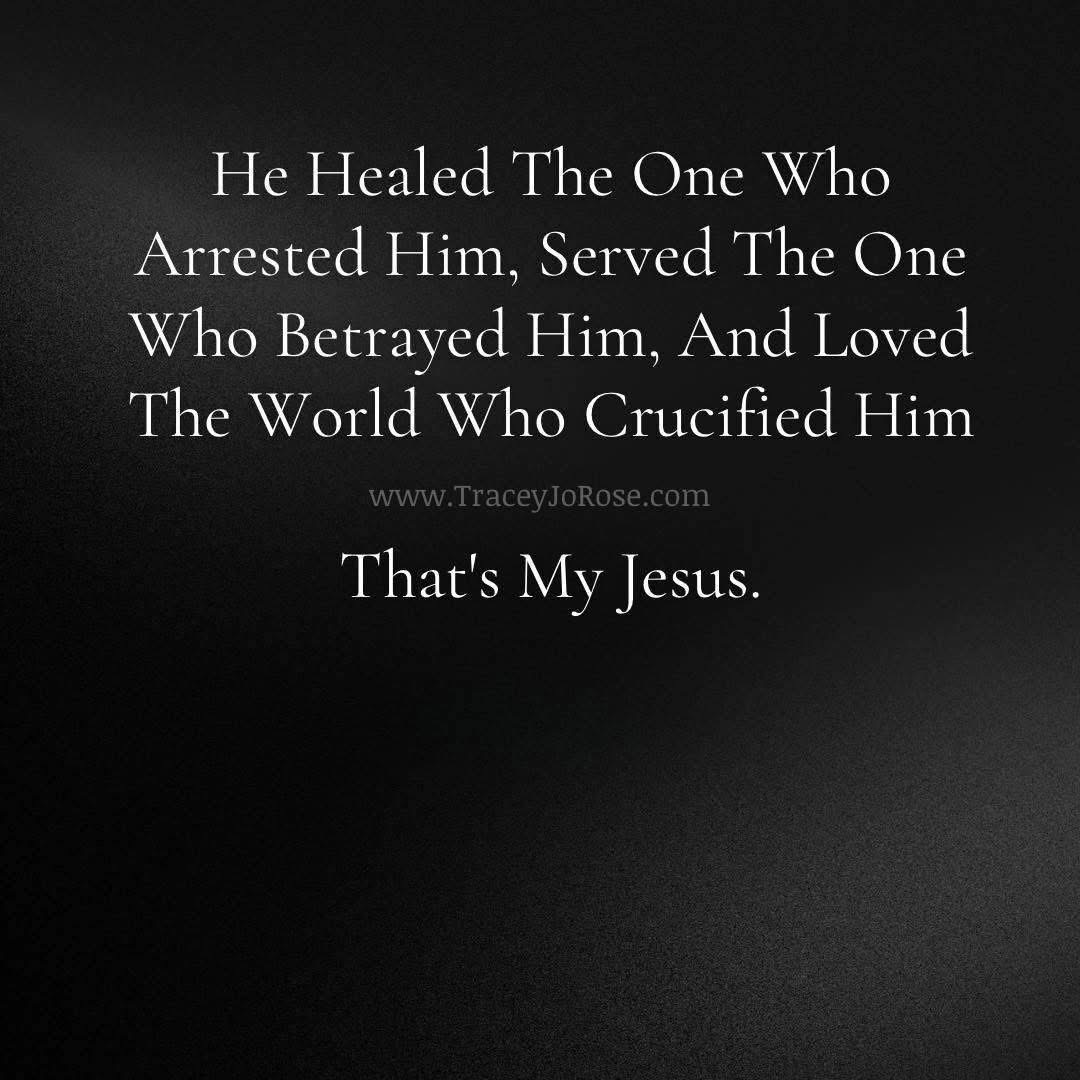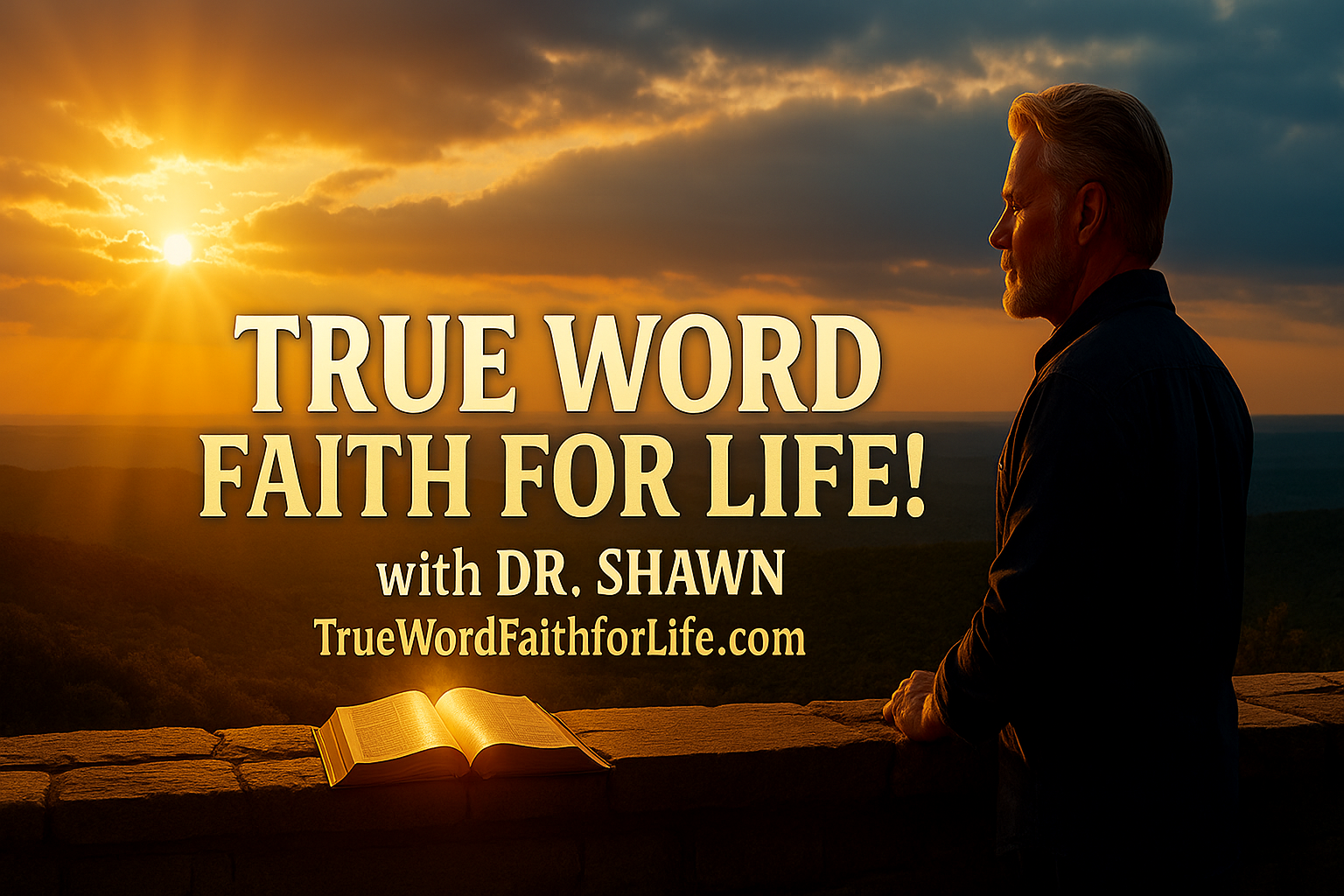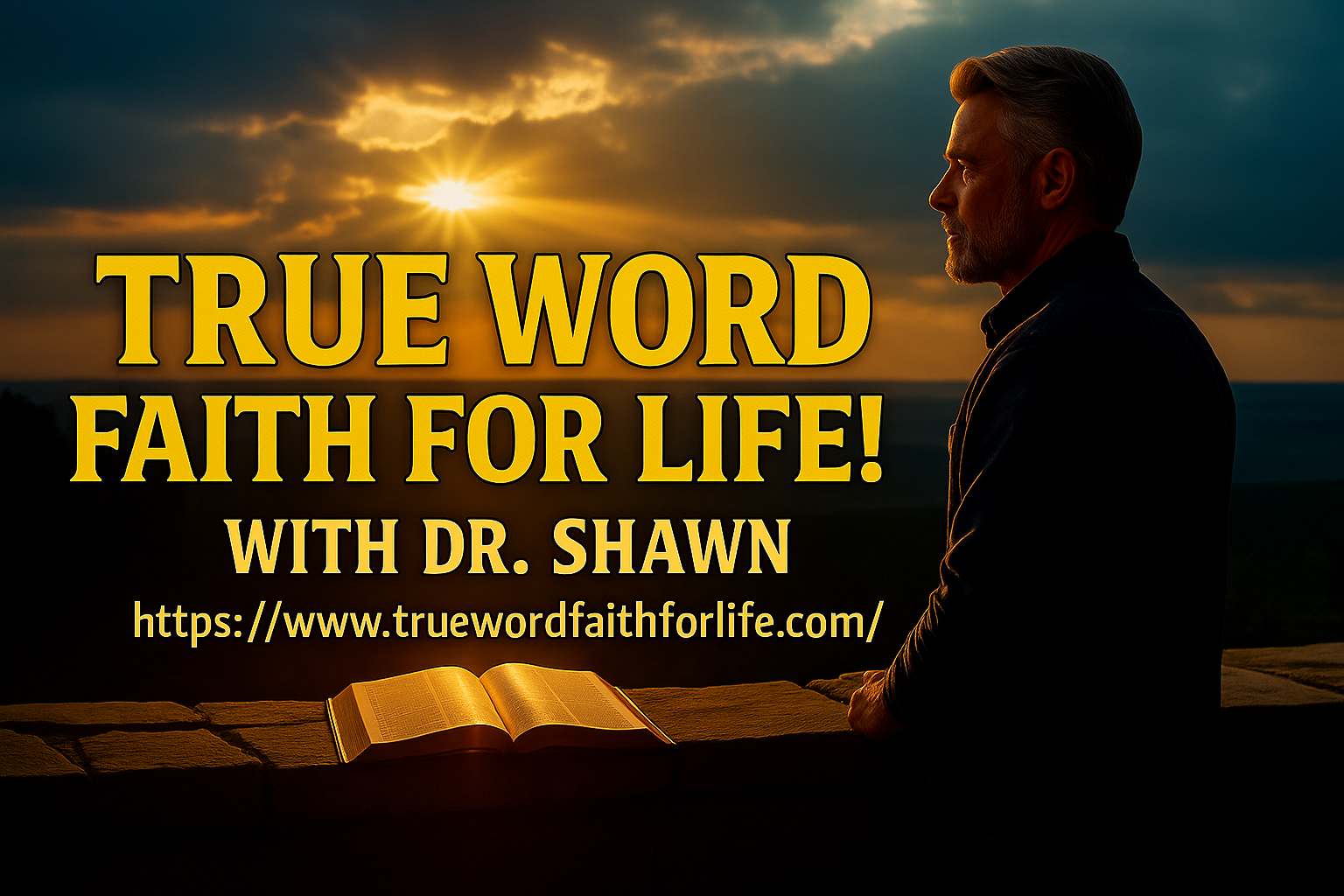Life in the Spirit: Heirs of the Promise!

Life in the Spirit: Heirs of the Promise
Series: Romans: Covenant, Faithfulness, and the Grafted-In Life
© 2025 Dr. Shawn M. Greener. All Rights Reserved.
True Word, Faith for LIFE!
WATCH the Podcast Episode on YouTube!
⸻
What if the Spirit of God inside you is not just comfort, but resurrection power itself?
What if your struggles, your groanings, and your seasons of suffering are not signs of failure but sacred ground where God reveals His covenant glory?
And what if nothing; absolutely nothing; can ever separate you from His love?
Romans chapter eight is not a whisper of hope. It is the anthem of life in the Spirit.
It declares that condemnation is over, adoption is secured, and glory is guaranteed.
⸻
No Condemnation — Only Covenant Freedom!
Romans 8 opens with a verdict that shatters shame:
“There is therefore now no condemnation for those who are in Messiah Yeshua.” (LEB)
The Greek word katákrima (κατάκριμα, pronounced kah-TAHK-ree-mah) means a judicial sentence of guilt. Paul says that the verdict has been overturned. The Judge Himself bore your sentence.
That means no believer should live in the courtroom of regret. If you belong to Messiah, you are not waiting for freedom. You are already walking in it.
⸻
The Spirit of Life — Not Religion, but Relationship
Paul contrasts two laws: the law of sin and death, and the law of the Spirit of life.
In Hebrew understanding, law (torah) meant instruction and covenant order.
So when he says the Spirit’s law has set you free, he means that divine order has been restored inside you.
Ruach HaKodesh (רוּחַ הַקֹּדֶשׁ, pronounced roo-AKH ha-KO-desh) is not an abstract force.
He is God’s own breath, restoring the life Adam lost.
He does not erase Torah. He inscribes it on the heart!
⸻
Resurrection Power in You!
Romans 8:11 says, “If the Spirit of the one who raised Yeshua from the dead dwells in you, He who raised Messiah Yeshua will also give life to your mortal bodies.”
The word “dwell” (oikeō, pronounced oy-KEH-oh) means to make a home.
God’s Spirit does not visit. He inhabits!
This means resurrection is not just future; it is present!
The same power that hovered over the waters in Genesis 1 now moves through you!
The same breath that gave Adam life breathes in you!
Taco Tony said once, “Doc, if that same Spirit raised Yeshua from the dead, then I’ve got no excuse for living like I’m half-alive.”
He was right. Most believers live as though the tomb is still half-closed. But resurrection life means you walk in power already given!
⸻
Adopted into God’s Family
In Roman culture, adoption was a permanent, legal act.
An adopted child lost all ties to the old family and gained full inheritance rights in the new one.
That is the picture Paul paints when he says, “You have received the Spirit of adoption by whom we cry, ‘Abba, Father.’”
In Aramaic, Abba (אַבָּא, pronounced AH-bah) carries deep intimacy.
It means belonging, not performance.
The Spirit Himself testifies that you are family.
⸻
Suffering is the Road to Glory
Paul writes, “The sufferings of this present time are not worth comparing with the glory that will be revealed in us.”
The Hebrew word kavod (כָּבוֹד, pronounced kah-VOHD) means weight or substance. Glory is not a glow; it is the tangible presence of God.
Creation groans for renewal, just as we groan for redemption.
Every tear, every prayer, every trial is part of that birth process.
Your pain is not punishment—it is the sound of transformation.
Tony said, “Doc, if groaning means glory’s coming, I must be real close to a breakthrough.”
He was only half joking.
Suffering is not a detour from glory. It is the path toward it!
⸻
The Spirit Prays When You Cannot!
When words fail, Ruach HaKodesh does not abandon you.
He intercedes with “groanings too deep for words.” (Romans 8:26)
The Greek word synantilambanetai (συναντιλαμβάνεται, pronounced soon-an-tee-lahm-BAH-nay-tai) means “to take hold together with.”
The Spirit steps under your burden and lifts it with you.
That is divine empathy.
When you cannot pray, God prays through you.
⸻
Covenant Love That Cannot Be Broken
Paul ends Romans 8 with a crescendo that silences all doubt:
“I am convinced that neither death nor life, nor angels nor rulers, nor things present nor things to come… nor anything else in creation can separate us from the love of God in Messiah Yeshua our Lord.”
The word agapē (ἀγάπη, pronounced ah-GAH-pay) does not mean emotion.
It means covenant loyalty.
God’s love is not fragile affection but eternal allegiance.
In Hebrew, separation meant exile.
Paul is announcing that exile is over forever!
The barrier between heaven and humanity has been crushed under the weight of crucified love.
⸻
Reflection
Ask yourself:
Where have I let condemnation define me more than covenant?
Am I living from fear, or from adoption?
Do I walk as a servant or as a son or daughter of the King?
Romans 8 calls us to live what we already are; free, Spirit-filled, and unbreakably loved!
⸻
Challenge and a Choice
You are no longer condemned! You are adopted! You are ALIVE!
The Spirit who raised Messiah from the grave dwells in you!
The question is not whether you have the Spirit, but whether the Spirit has all of you.
Will you keep living half-alive, or will you walk as one resurrected from within?
Let today be the day you live as an heir of promise!
⸻
Prayer of Salvation
Heavenly Father, I come to You today with an open and humble heart.
I know that I have sinned and fallen short of Your glory, and I am asking for Your forgiveness.
Right now, I turn away from my sins and turn fully toward You.
I believe that Jesus, Your Son, is the promised Messiah, that He died for my sins, was buried, and rose again on the third day just as the Bible says.
Today I call on Your holy Name. Please forgive me, cleanse me, and make me new.
Fill me with Your Holy Spirit and write Your truth on my heart.
From this day forward, I choose to follow Jesus as my Lord, my Redeemer, and my King.
Thank You for loving me, for saving me, and for making me part of Your family forever.
In the name of Jesus Christ, the King of Kings, I pray. Amen.
I am so excited for you because this decision is the most important of your existence! Contact me through TrueWordFaithforLife.com/contact and I will personally help you along the way.
⸻
Share This Message
If this message stirred your heart, share it.
Think of one person who needs encouragement or truth.
Send this post to them now.
Your share could be the very thing God uses to reach their heart.
⸻
Maybe today you feel distant or weak?
Maybe you think you have disappointed God too many times?
But the same Spirit that raised Yeshua from the grave lives in you.
You are His heir, His child, His delight!
Stand up. Breathe again. Live ALIVE!
Shalom b’Shem Yeshua.
© 2025 Dr. Shawn M. Greener. All Rights Reserved.
True Word, Faith for LIFE!
=================================================
Study Guide – Romans 8 | “Life in the Spirit: Heirs of the Promise”
Series: Romans: Covenant, Faithfulness, and the Grafted-In Life
© 2025 Dr. Shawn M. Greener. All Rights Reserved.
True Word, Faith for LIFE!
⸻
Summary
Romans 8:2 declares that “the law of the Spirit of life in Messiah Yeshua has set you free from the law of sin and death.”
This verse forms the hinge between the despair of Romans 7 and the victory of Romans 8. Paul contrasts two governing powers: one that enslaves through sin’s corruption and another that liberates through the Spirit’s indwelling. The language evokes Ancient Near Eastern covenant imagery, where a new royal decree could nullify an old one. The covenant of death introduced by Adam (Genesis 2:17) is overturned by the covenant of life sealed in Messiah and written upon the heart by the Spirit (Jeremiah 31:33; Ezekiel 36:27).
⸻
Key Greek and Hebrew Terms
Term | Transliteration & Pronunciation | Meaning | Context |
ὁ νόμος τῆς ἁμαρτίας καὶ τοῦ θανάτου | ho nomos tēs hamartias kai tou thanatou (ho NO-mos tace ha-MAR-tee-as kai too tha-NAH-too) | “The governing principle or law of sin and death.” | Represents the covenant power of corruption and separation from God. |
ὁ νόμος τοῦ πνεύματος τῆς ζωῆς | ho nomos tou pneumatos tēs zōēs (ho NO-mos too PNEU-ma-tos tace zo-EES) | “The law of the Spirit of life.” | The new covenant principle that restores relationship and life through the Spirit. |
רוּחַ הַקֹּדֶשׁ | Ruach HaKodesh (roo-AKH ha-KO-desh) | “The Holy Spirit.” | The divine presence that indwells and empowers covenant obedience. |
תּוֹרַת הַחֵטְא וְהַמָּוֶת | Torat ha-chet v’ha-mavet (to-RAHT ha-KHET v’ha-MAH-vet) | “Instruction of sin and death.” | Hebrew conceptual parallel describing bondage to rebellion and its consequence. |
תּוֹרַת הָרוּחַ הַחַיִּים בְּמָשִׁיחַ יֵשׁוּעַ | Torat ha-Ruach ha-Chayim b’Mashiach Yeshua (to-RAHT ha-ROO-akh ha-KHA-yeem b’ma-SHEE-akh Ye-SHOO-ah) | “Instruction of the Spirit of life in Messiah Yeshua.” | The covenant renewal fulfilled by Messiah and applied by the Spirit. |
ANE and Hebraic Context
In Ancient Near Eastern law codes, a new decree issued by a sovereign could replace a former legal precedent. Paul adopts this imagery: the “law of sin and death” governed humanity’s exile under Adam, while the “law of the Spirit of life” inaugurates the new creation under Messiah.
To the Hebraic mind, law (תּוֹרָה / torah) does not mean restriction but covenant instruction. The Spirit therefore does not abolish Torah but fulfills its purpose by internalizing it:
“I will put My Torah within them and write it on their hearts.” (Jeremiah 31:33)
“I will put My Spirit within you and cause you to walk in My statutes.” (Ezekiel 36:27)
Paul’s claim that believers are “set free” (eleutherōsen, ἐλευθέρωσεν) echoes Israel’s deliverance from Egypt. Freedom is not lawlessness but the capacity to live in covenant fidelity through divine empowerment.
⸻
Comparative Table: Two Laws in Contrast
Aspect | Law of Sin and Death | Law of the Spirit of Life |
Origin | Adamic rebellion | Messiah’s obedience |
Covenant Type | Broken covenant of exile | New covenant of restoration |
Mediator | Flesh (human self-rule) | Spirit (divine indwelling) |
Outcome | Condemnation and separation | Justification and adoption |
Symbol | Stone tablets outside the heart | Torah written within the heart |
Result | Death (thanatos) | Life (zōē) |
Theological Insight
Paul’s argument is not dualistic but covenantal. The “law” that kills is not the Torah itself but sin’s misuse of it. The same commandment that was meant to bring life became death when divorced from covenant relationship (Romans 7:10–11). The Spirit reverses this distortion by restoring intimacy with God.
Dr. Skip Moen observes that in Hebraic thought, “obedience is the outcome of relationship, not the condition of it.”
Thus, the Spirit’s law is not an abstract force but the relational presence of God renewing His people from within.
⸻
Cross-References
•Genesis 2:17 — “For in the day that you eat from it, you shall surely die.” (Origin of the law of death)
•Jeremiah 31:33 — “I will put My Torah within them and write it on their hearts.” (Promise of internal law)
•Ezekiel 36:27 — “I will put My Spirit within you and cause you to walk in My statutes.” (Spirit-empowered obedience)
•Romans 8:1–2 — Freedom through the Spirit’s law of life.
⸻
Discussion and Reflection
1. How does understanding law as “covenant order” rather than “legal restriction” change the way you read Romans 8:2?
2. In what ways does the Spirit’s indwelling restore rather than replace Torah?
3. How can believers live daily from the “law of the Spirit of life” amid a world still ruled by death?
4. Reflect on Jeremiah 31:33: how have you experienced God writing His truth on your heart?
5. What practical disciplines help you remain sensitive to Ruach HaKodesh as the guiding presence of covenant life?
⸻
Practical Application
•Renew Your Mind: Replace self-reliance with Spirit-dependence through daily prayer and Scripture meditation.
•Walk in Freedom: Refuse condemnation; live from gratitude, not guilt.
•Embrace Covenant Identity: Remember that the Spirit’s witness (symmartyreō, συμμαρτυρέω, soom-mar-too-REH-oh) confirms your adoption.
•Model Resurrection Life: Let the life of Messiah be visible in your words, compassion, and endurance through trials.
⸻
Bibliography
•The Holy Bible, Lexham English Bible. Bellingham, WA: Lexham Press, 2012.
•The Complete Jewish Study Bible. Edited by Barry Rubin and Rabbi Jonathan Bernis. Peabody, MA: Hendrickson Publishers, 2016.
•Heiser, Michael S. Reversing Hermon: Enoch, the Watchers, and the Forgotten Mission of Jesus Christ. Crane, MO: Defender Publishing, 2017.
•Moen, Skip. Spiritual Restoration: Rediscovering the Hebraic Foundations of Faith. Winter Park, FL: At God’s Table, 2010.
•Richards, Lawrence O. The Bible Reader’s Companion. Wheaton, IL: Victor Books, 1991.
•Wright, N. T. Romans. In Paul for Everyone. Louisville, KY: Westminster John Knox Press, 2004.
⸻
Shalom b’Shem Yeshua.
© 2025 Dr. Shawn M. Greener. All Rights Reserved.
True Word, Faith for LIFE!
Summary
Romans 8 stands as the climactic declaration of Paul’s theology of redemption and covenant faithfulness. After walking his audience through the tension between Torah, sin, and grace in chapters 6 and 7, Paul now unveils the triumphant reality of life in the Ruach HaKodesh (the Holy Spirit). There is no condemnation for those in Messiah Yeshua (Romans 8:1), because the covenant relationship once fractured by sin has been fully restored through the Spirit’s indwelling power.
Paul contrasts two ways of being human: living “according to the flesh” (kata sarka) and living “according to the Spirit” (kata pneuma). These are not simply moral choices but covenantal realities. To walk in the flesh is to live under Adam’s curse of self-rule. To walk in the Spirit is to live under Messiah’s reign of resurrection life.
In the Ancient Near Eastern (ANE) context, adoption was a legal declaration of inheritance. Paul uses that imagery to describe the believer’s standing before God: not servants, but sons and daughters, sealed by the Spirit as heirs. This same Spirit who raised Yeshua from the dead now gives life to mortal bodies and groans with creation for ultimate redemption.
Romans 8 also frames suffering within covenant hope. Pain is not proof of abandonment but participation in Messiah’s own path to glory. Finally, Paul crescendos with the unshakable assurance that nothing in heaven or earth can separate God’s covenant people from His love in Messiah.
Romans 8 is not merely a chapter of comfort. It is a covenant anthem declaring: You are free. You are adopted. You are alive in the Spirit.
⸻
Primary Text
Romans 8:1 (LEB)
“There is therefore now no condemnation for those who are in Christ Jesus.”
Romans 8:1 (CJSB)
“Therefore, there is no longer any condemnation awaiting those who are in union with the Messiah Yeshua.”
Paul’s phrase “in Messiah” (ἐν Χριστῷ, en Christō) reflects Hebraic covenant identity—belonging within the faithful family of God.
⸻
Key Hebrew and Greek Terms
1. Ruach HaKodesh (רוּחַ הַקּוֹדֶשׁ, pronounced roo-AKH ha-KO-desh) — “The Holy Spirit.”
In Hebrew thought, Ruach means breath, wind, or spirit. The term embodies divine presence and life-force. To live “in the Spirit” is to live animated by God’s own breath, a return to Edenic relationship.
2. Sarx (σάρξ, pronounced SARX) — “Flesh.”
Not merely the body, but the human tendency toward self-reliance and rebellion against God. In ANE anthropology, the flesh symbolizes mortality and frailty apart from divine life.
3. Pneuma (πνεῦμα, pronounced PNYOO-mah) — “Spirit.”
Rooted in the same conceptual family as Hebrew Ruach. The Spirit restores the life Adam lost, empowering obedience through love, not law.
4. Huiothesia (υἱοθεσία, pronounced hoo-ee-o-THEE-see-ah) — “Adoption.”
In Roman law, adoption granted full inheritance rights to an heir. Paul redefines believers as legitimate sons and daughters in God’s household through the Spirit’s witness (Romans 8:15–17).
5. Abba (אַבָּא, pronounced AH-bah) — “Father.”
An Aramaic term of intimacy and respect, expressing familial relationship. The Spirit enables believers to approach God not as distant judge but as loving Father.
6. Sun-doxazō (συνδοξάζω, pronounced soon-dok-SAH-zo) — “To be glorified together.”
Refers to shared participation in Messiah’s glory through shared suffering. The covenant pattern of suffering and vindication is central to Paul’s theology.
7. Teshuvah (תְּשׁוּבָה, pronounced te-SHOO-vah) — “Return” or “repentance.”
In Hebrew thought, repentance is relational restoration, a coming home to covenant faithfulness. The Spirit enables teshuvah by transforming the heart.
8. Agapē (ἀγάπη, pronounced ah-GAH-pay) — “Love.”
Not emotion, but covenant loyalty and sacrificial faithfulness. God’s agapē anchors the assurance that nothing can separate His people from Him.
⸻
Historical and Cultural Background
Rome in the first century was a city of power, hierarchy, and adoption. Elite Roman families adopted heirs to secure legacy and name. Paul draws on this imagery, but he redefines adoption as divine grace. In Messiah, slaves of sin are made heirs of God’s kingdom.
The Greco-Roman world viewed flesh and spirit as opposing substances, but Hebraic thought viewed them as integrated dimensions of human life. The problem was not the physical body but its domination by sin. Paul’s anthropology aligns with Genesis: humans are dust animated by divine breath. Life in the Spirit restores that original partnership with God’s breath.
Creation’s “groaning” (Romans 8:22) reflects ANE cosmology where creation itself was relational. The natural world shared in humanity’s fate. Thus, redemption is not escapism from creation but renewal of it.
⸻
Comparative Translation Insight
Translation | Text | Key Nuance |
LEB | “For the law of the Spirit of life in Christ Jesus has set you free from the law of sin and of death.” | Emphasizes freedom as an accomplished covenant act. |
CJSB | “Why? Because the Torah of the Spirit, which produces this life in union with Messiah Yeshua, has set me free from the ‘Torah’ of sin and death.” | Restores Hebraic sense of Torah as divine instruction, not legalism. Shows the Spirit fulfills God’s law by writing it on the heart. |
Both translations converge on the same truth: Torah and Spirit are not enemies but partners in covenant transformation.
⸻
Theological Framework
1. No Condemnation (Romans 8:1–4)
The judicial sentence of death in Adam has been replaced by life in Messiah. The Spirit fulfills what the Torah pointed toward: righteousness that flows from relationship, not regulation.
2. Life and Peace (Romans 8:5–11)
To set the mind on the Spirit (phronēma tou pneumatos) is to participate in divine peace (shalom). The Spirit who raised Yeshua from the dead now reanimates believers to live beyond fear.
3. Adoption and Inheritance (Romans 8:14–17)
Believers are not servants hoping for mercy but sons and daughters possessing it. The Spirit’s witness within us; crying “Abba!” confirms belonging that transcends emotion or performance.
4. Suffering and Glory (Romans 8:18–25)
Pain is not an interruption to covenant life but the crucible where glory is forged. Paul frames suffering within creation’s groaning; cosmic birth pangs awaiting renewal. Hope (elpis) in Scripture is not wishful thinking but confident expectation.
5. Intercession of the Spirit (Romans 8:26–27)
When words fail, the Spirit intercedes in stenagmois alalētois (“groanings too deep for words”). Prayer is thus divine participation; God praying through His people.
6. God’s Covenant Faithfulness (Romans 8:28–39)
The chain of salvation—foreknown, predestined, called, justified, glorified; reveals God’s unbreakable plan. Paul’s crescendo ends not with logic but with love: nothing in all creation can separate us from the love (agapē) of God in Messiah Yeshua.
⸻
Discussion Questions
1. How does understanding Ruach HaKodesh as “God’s breath” change your perspective on life in the Spirit?
2. Why does Paul connect adoption with suffering and glory? What does this reveal about discipleship?
3. In what ways do you see modern believers struggling to live “according to the Spirit” rather than “according to the flesh”?
4. How do verses 26–27 comfort you when you feel unable to pray?
5. What does Romans 8:38–39 reveal about the permanence of God’s covenant love?
⸻
Practical Application
1. Live in Assurance: There is no condemnation. Stop revisiting forgiven sins. Live from identity, not insecurity.
2. Walk in the Spirit: Choose each day to let Ruach HaKodesh guide thoughts, speech, and responses.
3. Embrace Adoption: You are a son or daughter of the King. Speak and act from belonging, not striving.
4. Reframe Suffering: View trials as participation in Messiah’s story. Pain becomes the soil of future glory.
5. Pray with Confidence: Even silence can be Spirit-led intercession. Yield to God’s breath within you.
6. Rest in Covenant Love: God’s agapē is not fragile. It outlasts failure, fear, and time itself.
Key Takeaway
Romans 8 is the covenant anthem of freedom. Life in the Spirit is not an abstract doctrine but a lived reality of power, intimacy, and victory. You are no longer under condemnation. You are an heir of promise, indwelt by the same Spirit who raised Messiah from the dead. Live as one who is free, fearless, and forever loved.
⸻
Bibliography
The Holy Bible, Lexham English Bible. Bellingham, WA: Lexham Press, 2012.
The Complete Jewish Study Bible. Edited by Barry Rubin and Rabbi Jonathan Bernis. Peabody, MA: Hendrickson Publishers, 2016.
Heiser, Michael S. Reversing Hermon: Enoch, the Watchers, and the Forgotten Mission of Jesus Christ. Crane, MO: Defender Publishing, 2017.
Moen, Skip. Spiritual Restoration: Rediscovering the Hebraic Foundations of Faith. Winter Park, FL: At God’s Table, 2010.
Wright, N. T. Paul for Everyone: Romans Part Two (Chapters 5–16). Louisville, KY: Westminster John Knox Press, 2004.
Richards, Lawrence O. The Bible Reader’s Companion. Wheaton, IL: Victor Books, 1991.
Keener, Craig S. The Mind of the Spirit: Paul’s Approach to Transformed Thinking. Grand Rapids, MI: Baker Academic, 2016.
⸻
Shalom b’Shem Yeshua
© 2025 Dr. Shawn M. Greener. All Rights Reserved.
True Word, Faith for LIFE!
Romans 8, Life in the Spirit, Holy Spirit teaching, Resurrection power, Christian encouragement, Spirit of God, Biblical teaching, Follower of the Way, Dr Shawn Greener, True Word Faith for LIFE, Yeshua, Jesus Christ, Christian podcast, Christian sermon, Bible study, Covenant life, Spiritual growth, Faith in suffering, Holy Spirit power, Christian identity, God’s love, Nothing can separate us, Hope in Christ, Overcoming struggle
#TrueWordFaithForLIFE, #Romans8, #LifeInTheSpirit, #HolySpirit, #FollowerOfTheWay, #Yeshua, #ChristianTeaching, #ResurrectionPower, #FaithAndHope, #BiblicalTruth, #ChristianPodcast, #CovenantLife









